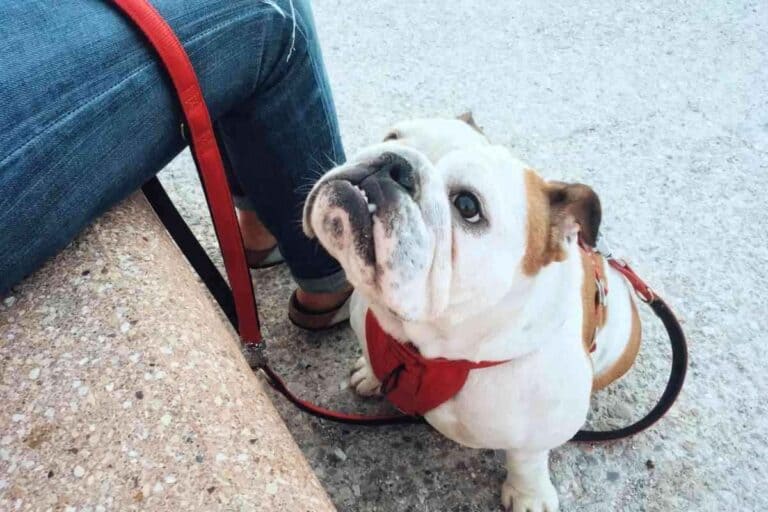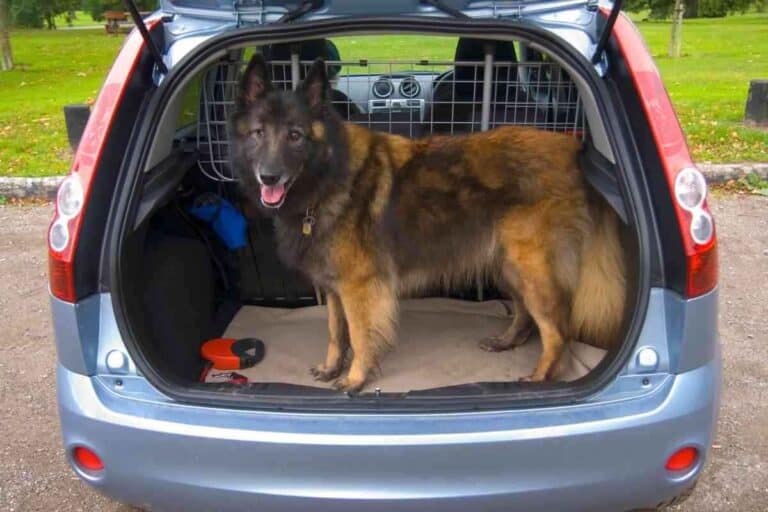Do French Bulldogs Bark a Lot? (And How to Make it Stop)
Many people consider French Bulldogs to be super cute due to their squished faces. With the way their faces are shaped, they are known to make a lot of noise from loud panting, snorting, and grunting. However, these dogs are still able to produce a loud bark.

Are French Bulldogs Big Barkers?
Even with all the other noises French Bulldogs are known to make, they are not known as excessive barkers. These dogs will occasionally bark as all dogs do, but they won’t bark as much as other small dogs.
Many owners of French Bulldogs have agreed that their dogs don’t bark as often as they might’ve expected. A survey concluded that 85% of the participants stated that their French Bulldog doesn’t bark a lot.
They won’t give off that high-pitched bark that many other small dogs have. Their bark is a bit deeper than other small dog breeds, though it is still much higher-pitched than their English Bulldog counterparts.
A French Bulldog will normally only bark when they need to communicate something to you. This can be them communicating a need or alerting you that someone is coming to the door. Why French Bulldogs barks will be discussed further later on.
With the number of other noises French Bulldogs make, barking isn’t needed. These dogs have plenty of ways to communicate what they need.
Why Do French Bulldogs Bark?
There are many reasons why any dog barks, and those are reasons that are shared with French Bulldogs. These dogs aren’t immune to things like fear and anxiety and may bark for those reasons.
Strangers
Most dogs are protective of their owners, and they want to protect them from any possible threat. To many dogs, anyone coming up to the door can be considered a threat, even if the same person has been to the house many times before.
A French Bulldog is likely to bark at the door or window when someone is getting too close for comfort. They want to alert you that someone is near so that you can also be aware of a threat.

Separation Anxiety
A French Bulldog with separation anxiety might bark at you whenever you leave. After living in a time when many people have spent more time at home, dogs got used to having their owners around way more often. Now, with owners going out once again to work or the store, a French Bulldog may not be used to that anymore and get anxious that its owner is leaving.
If your French Bulldog suffers from separation anxiety, there are certain training methods that you can use to get your dog used to your absence once again. Though, it will take a lot of time to get results.
Playing
French Bulldogs are excitable creatures and love to play. When you are playing with your Frenchie, they will likely start barking and jumping around. This bark indicates that they are having fun and that they like playing.
If you have other dogs, whether they are other Frenchies or not, your French Bulldog is likely to bark at them when they play as well. This is just how a French Bulldog shows that it is playing.
When They Need Something
A French Bulldog will often bark to tell its owner that it needs something. Sometimes, your Frenchie will bark when you walk near the food bowl, sometimes you’ll hear barking when walking past the front door. This kind of barking is your French Bulldog’s way of telling you that its needs aren’t currently being met and that they need something from you.
Left Alone
This is similar to barking for separation anxiety. Even if they don’t have separation anxiety, French Bulldogs are social creatures, and they don’t like being left alone. If they are being left alone for a long time, or when they don’t know where their owner is, they will often start barking.
They Are in Pain
Just as a person might shout out when they get hurt, a French Bulldog will bark when they are in pain. This behavior is usually accompanied by another tell of their injury such as limping or licking at the injured spot.
If you notice that your French Bulldog is barking out in pain, look at the problem. See if there are any noticeable wounds or lumps where there shouldn’t be.
Sometimes, the pain might be temporary and your Frenchie will be fine. This is usually the case if they accidentally bump into a surface or they accidentally get stepped on. However, if you notice that your Frenchie is showing signs of pain for an extended time, you should take them to the vet to get checked out. Of course, if you notice a very visible wound immediately, try cleaning and bandaging their wound, and then take them to the vet.
How Do I Get My French Bulldog to Stop Barking?
If you live in a small apartment where you are concerned about keeping proper noise levels or if you simply don’t like barking, you can train your French Bulldog to lessen their barking.
Of course, you won’t be able to completely stop your French Bulldog from barking, but training can encourage them to express their needs in different ways if you have an especially vocal Frenchie.
You can either train your French Bulldog to stop barking as much yourself, or you can get the help of a professional trainer. Either way is valid, though training your dog yourself will take a lot of determination, persistence, and time.
Don’t Reward for Barking
Many owners don’t realize that when they give their Frenchie attention when they are barking, they are rewarding the behavior. Often, a Frenchie will bark for attention, and being given that attention encourages the behavior further.
Don’t give your French Bulldog attention if they are barking. Ignoring the behavior works to discourage them from barking.
Give a Command
Start a command with your French Bulldog that tells them to stop barking. This can be as simple as the word “quite” or “silent.” Don’t use a word that you have connected with another behavior though. Using the word “stop” might be confusing if you have trained your dog to, for example, stop walking when you use that command.
When training a new command, give your Frenchie a treat every time they successfully complete the command. This will encourage them to follow through with the behavior more often and just teach them that the wanted behavior is connected to that command.
Practice
You will have to practice the command several times so that your Frenchie can fully learn it. To start, wait until your Frenchie has stopped barking or at least has quieted down before giving the command. This quiet might only last for a few seconds, so you must be quick to then give the command.
If your Frenchie stays quiet for a few more seconds after you give the command, give it a treat. Every time your Frenchie is silent after barking, give a treat to teach the command. Continue doing this for a few barking fits so your Frenchie can make the necessary associations.
After a while, you can try to do the command without a treat. If your Frenchie successfully follows the command, they’ve fully learned it. If they fail to follow through, continue doing treat training.
Be Persistent
You need to follow through with teaching the command every single time. Ignoring the problem one moment and then practicing the command the next can confuse your Frenchie and prolong training time. Being persistent and consistent is key to effectively teaching your Frenchie a quiet or silent command.
Final Thoughts
Frenchies are adorable dogs with an assortment of funny noises. They will sometimes bark, but not nearly as much as some other small dogs. Many owners of Frenchies agree that the barking levels of their French Bulldogs are low, though they will often bark at any strangers coming up to the door.
All dogs bark sometimes, and they often bark for the same reasons. French Bulldogs are no exception to barking at a stranger or barking for attention.
Some people need their French Bulldog to reduce their levels of barking, and there are ways to do that through training. The easiest way to train your French Bulldog to reduce their barking levels is to create a “quiet” command that will tell them to stop barking.
Training a new command takes time, persistence, and dedication. Be prepared to demonstrate those traits if you want to train your French Bulldog to stop barking.
Being able to communicate with your dog is super important so that you can take care of all of their needs. French Bulldogs have so many ways to communicate those needs, it just takes some time and listening.






